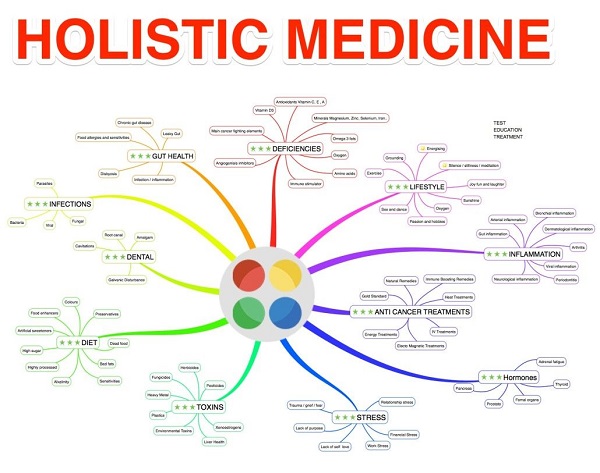
In today's fast-paced world, the pursuit of well-being often feels like a marathon, not a sprint. We're bombarded with quick fixes, fad diets, and miracle cures, all promising instant gratification. But true health isn't a destination; it's a journey, one that requires a holistic approach that considers the interconnectedness of mind, body, and spirit. This comprehensive guide will delve into the core principles of holistic medicine, providing you with the knowledge and tools to embark on your own path to lasting wellness.
What is Holistic Medicine?
Unlike conventional medicine, which typically focuses on treating individual symptoms or diseases, holistic medicine takes a broader, more integrated approach. It recognizes that your overall well-being is influenced by a complex interplay of factors, including your physical health, emotional state, mental clarity, and spiritual connection. Holistic practitioners consider the whole person, not just the disease. This approach emphasizes prevention, self-care, and the body's inherent capacity for healing.
Key Principles of Holistic Medicine:
Several key principles underpin the philosophy of holistic medicine:
- The Interconnection of Mind, Body, and Spirit: Holistic medicine acknowledges that these three aspects are intrinsically linked. Emotional stress, for instance, can manifest as physical symptoms, highlighting the importance of addressing all aspects of your being.
- Prevention is Key: Rather than just treating illness, holistic medicine emphasizes preventive measures, such as healthy lifestyle choices, stress management techniques, and regular check-ups, to minimize the risk of disease.
- Patient Empowerment: Holistic practitioners empower their patients by providing them with the knowledge and tools to actively participate in their own healing journey. This collaborative approach fosters a sense of ownership and responsibility for one's health.
- Natural Healing: Many holistic approaches utilize natural therapies, such as herbal remedies, acupuncture, and nutritional adjustments, to stimulate the body's natural healing processes.
- Individualized Care: Recognizing that each person is unique, holistic medicine tailors treatment plans to individual needs and preferences, ensuring a personalized approach to well-being.
Holistic Practices and Therapies:
The range of holistic practices is vast and diverse. Some of the most common include:
- Acupuncture: This ancient Chinese technique involves inserting thin needles into specific points on the body to stimulate energy flow and promote healing.
- Herbal Medicine: Using plant-based remedies to address various health concerns, herbal medicine harnesses the healing power of nature.
- Yoga and Meditation: These practices promote physical flexibility, mental clarity, and emotional balance, contributing to overall well-being.
- Chiropractic Care: Focusing on the musculoskeletal system, chiropractic adjustments aim to improve spinal alignment and reduce pain.
- Nutritional Therapy: This approach emphasizes the role of diet in maintaining health and preventing disease, often involving personalized dietary plans.
- Massage Therapy: Massage promotes relaxation, reduces muscle tension, and improves circulation.
- Mindfulness and Stress Reduction Techniques: Techniques like meditation, deep breathing, and mindfulness practices help manage stress and promote emotional well-being.
Finding a Holistic Practitioner:
When seeking a holistic practitioner, it's crucial to do your research. Look for practitioners with appropriate certifications and experience. A good practitioner will take the time to understand your individual needs and work collaboratively with you to develop a personalized treatment plan. Don't hesitate to ask questions and ensure you feel comfortable and understood.
Integrating Holistic Medicine into Your Life:
Holistic medicine isn't just about seeking out specialized treatments; it's about adopting a holistic lifestyle. This involves making conscious choices that support your physical, emotional, and spiritual well-being. Consider incorporating these elements into your daily routine:
- Mindful Eating: Pay attention to what you eat, choosing whole, unprocessed foods that nourish your body.
- Regular Exercise: Find activities you enjoy and aim for at least 30 minutes of moderate-intensity exercise most days of the week.
- Stress Management: Practice relaxation techniques like meditation, yoga, or deep breathing to manage stress effectively.
- Adequate Sleep: Aim for 7-9 hours of quality sleep each night.
- Strong Social Connections: Nurture relationships with loved ones and build a supportive community.
- Mindfulness and Self-Reflection: Take time each day to connect with yourself and reflect on your thoughts and feelings.
Conclusion:
Embarking on a journey of holistic wellness is a transformative experience. It's about empowering yourself to take control of your health and well-being by focusing on the interconnectedness of mind, body, and spirit. This guide provides a foundation for your exploration, but remember that the path to holistic health is unique to each individual. Be patient, be persistent, and celebrate the small victories along the way. Your journey to lasting wellness is worth it.
Disclaimer: Artikel ini diolah dari berbagai sumber.
Comments